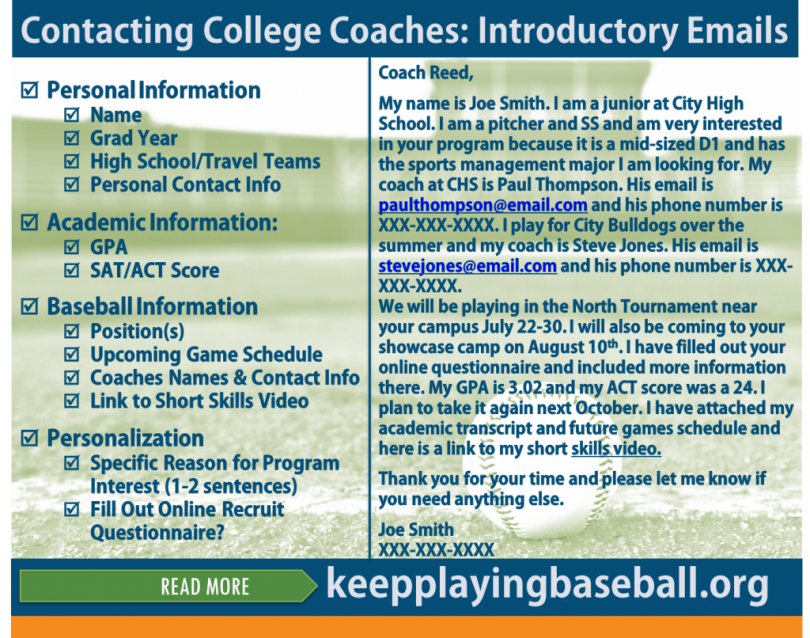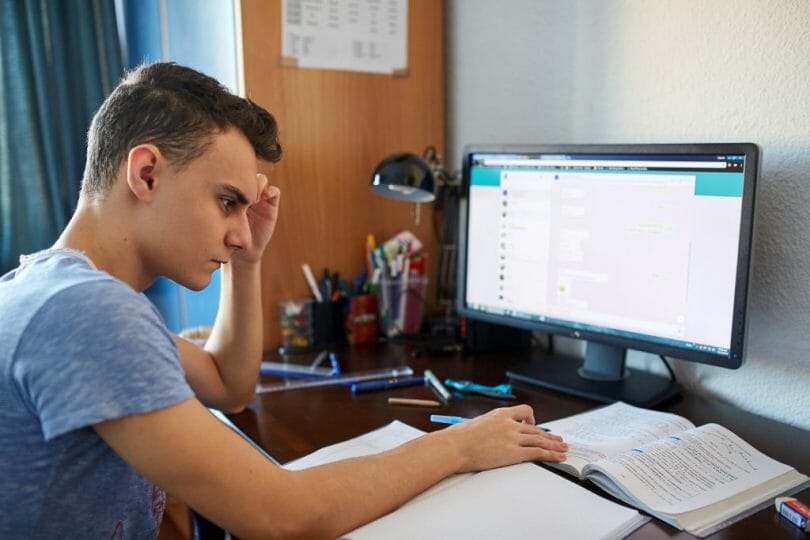You’ve been patiently preparing and learning about what it takes to play college baseball. Now you’ve determined you are ready to contact coaches at schools of interest and seek exposure. This is an exciting time, but...
Step 5: Contact Coaches and Seek Exposure
Do This
✅Make sure the timing of your contact is appropriate for your skill level, the recruiting calendar, and when each school of interest will be recruiting players in your class
✅Before initiating contact, use this PDF checklist to make sure you have everything ready for contact with coaches (game schedule, transcripts and test scores, etc.)
✅Revise your schools list as you hear back from schools or hear from new schools
✅Make time to work on non-verbal forms of communication, which will be incredibly important for making lasting positive impressions
✅Double check the privacy settings on your social media accounts and that your social media is representative of the way you want to be portrayed
✅Have someone look over and proofread your emails before you send them
✅Cast a wide net by contacting coaches and emailing all programs of interest that fit your academic and baseball skill set and interests
✅Respond to emails and calls from college coaches promptly (Remember, they are recruiting other players as well and the more responsive you are, the better. Never take more than 48 hours to respond, and under 24 hours is preferred.)
✅Follow up on ignored emails or phone calls after 1-2 weeks to verify that coaches received them and reiterate your interest (Sometimes coaches get busy and need reminders, sometimes emails get lost in the shuffle, and other times they are simply not interested. It's always best to try to clarify so you have no doubts!)
Learn About This
✅Learn about what needs to be included in an email to college coaches
✅Learn about non-verbal communication off the field and how it impacts your recruitment
✅Learn about non-verbal communication on the field and how it impacts your recruitment
✅Learn about what college coaches look for and evaluate in recruits on and off the field
✅Learn why waiting to contact schools can save you money and help you get recruited
✅Learn about when schools at different levels recruit players
✅Learn about the appropriate timing for YOU to contact coaches based on your skill level, the recruiting calendar, and when that school is likely to start recruiting players in your class
Read This
Step 5: What to Read and Research
The ‘Read This’ section of Step 5 continues to prepare you for exposure to college coaches. Now that you are reaching out to schools and putting yourself on the radar of coaches, you’ll want to make sure you...
Academics
Contacting coaches and seeking exposure is an exciting time. You've been patient, you've been focused on development and academics, and it's finally paying off! The only question left is what type of academic info should you include in your introductory emails to coaches and how should you include it. You have two major options.
1) Include current copies of your transcripts and unofficial test scores as attachments to the email.
2) Include a short sentence that describes your GPA, NCAA Core GPA and test scores within the body of the email. For example: My GPA is a 3.7 (NCAA Core GPA 3.4) and my 2-part SAT score is an 1010.
These are two easy and effective ways to get coaches the information they need about your academics. Of course, providing this information is most effective when coaches will like what they see. Keep working hard to get those grades and test scores where you want them to be!
Player Development
Caution! This is where the recruiting process gets off-track for some recruits. You have spent years developing and improving into a recruitable player. You are more mature, talented, and stronger than ever. Coaches are starting to take note of your talent and presence on the field and you are ready to start contacting schools of interest and seeking exposure.
So what is the cautionary tale? Your great development plan is what got you this far, now that you are getting interest and looks from coaches is not the time to abandon it. Profit-seeking companies may be encouraging you to sell out for exposure, but you know better than that. Even though you are starting to seek exposure for yourself and may even be going to some events that college coaches are recruiting, you must keep development a priority! The last thing you want to do now that you are getting interest is change the process that has been working. Keep improving your plan, keep hitting the weight room, keep finding time to get your work in, and keep asking people to tell you where you are coming up short and how you can get better. Prioritize development, mix in useful exposure opportunities, and create your own exposure by contacting coaches at schools of interest. The work that shows coaches you have what it takes to play for them happens behind the scenes when no one is watching. Stick with your plan and play hard and with passion between the lines.




